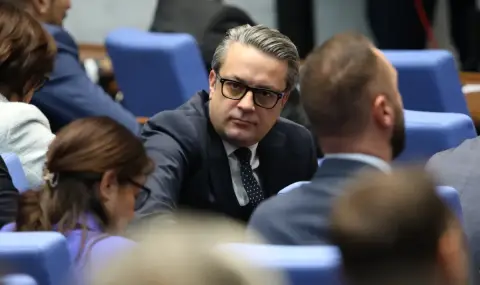"Atanas Atanasov is an opportunity to negotiate for the creation of a managerial majority. We would only support it if we started negotiations for a majority. There is no negotiating table. We want a table for negotiations, but we hope that they will be conducted in a logical way, according to the rules of politics."
This was stated by Toma Bikov from GERB to the BNR. He was adamant that Atanasov's candidacy was not considered in itself, but as an opportunity to negotiate a government and emphasized that a clear political majority was needed in principle, not for a few laws.
In the show "Politically INCORRECT" Bykov confirmed that GERB still aims to "cast a regular government in the 51st National Assembly with a clear majority and clear political responsibility".
With a declaration, negotiations end, they do not begin, Toma Bikov emphasized and added:
"They confuse a lot with the fact that they want an equidistant prime minister, because he can turn out to be much more uncontrollable than Borisov."
With the second and third terms, there is no potential to form a government, but with the first, there is, he reminded.
"Raya Nazaryan is not Delyan Peevski's person, he has nothing to do with Delyan Peevski. This labeling is a problem. This led them to participate in negotiations with "Vazrazhdane", MECH, ITN, etc., as long as it wasn't the GERB man."
Three people are definitely in favor of elections – Kostadin Kostadinov, Delyan Peevski and Asen Vasilev, who did not say it directly, but at every opportunity to blow up the situation, even at the cost of splitting his own parliamentary group, he does, said Bykov.
If Silvi Kirilov is elected, we will go to early elections with interim Prime Minister Silvi Kirilov. GERB supports Nataliya Kiselova on the condition that no support is sought from the DPS – NN and "Vazrazhdane", explained Bykov in connection with the blockade of the election of the Speaker of the Parliament.
According to him, "this unblocking is an invalid thesis - nothing will be unblocked, and we will end up in a much more complicated situation.
"If they elected Silvi Kirilov, or if they had elected him this week, our action would have been to declare that we are the opposition within the 51st National Assembly and then they could uncork whatever they wanted along with the majority who elected Mr. Kirilov."
The constitutional framework begins to interfere with too many factors in society, which does not lead to a constitutional debate that does not have a conjunctural character, reports Toma Bykov.
Borisov is an unavoidable factor in politics, even as a representative, the MP believes. At the moment, he does not see a tendency to doubt Borisov's leadership role, because "he is on the field", unlike Ahmed Dogan.
"Dogan and Borisov are different characters on the political field. Comparing them is like comparing apples to pears. Dogan has always been in the role of a person who decided where the balance should tip, a politically literate person who anticipated certain trends. Borisov has a completely different role – of a legitimate leader of 3 governments. Dogan participated in the balance, Borisov did the balance. Borisov showed even to his biggest opponents that he is a representative of a lasting trend in Bulgarian society and manages to manage this trend."
To appear "phenomenal" man, there must be a political vacuum in the party, stressed Toma Bykov.
Counter-revolutions are less traumatic for society, explained Bykov, presenting his book "Bulgarian counter-revolutions and the end of ideologies".
Bulgarian society is not authentically western, it is westernized. Ideologies come from the West, and when ideological systems are Bulgarianized, in our country they become a means of arguing for political presence. We are a society standing on a civilizational divide, he added.
In his words, global liberal democracy stumbles into cultural spaces that are not suitable for this system.
"We are traditionally in the border zone of the civilization we inhabit. We have inhabited 4 civilizations – Byzantine, Ottoman, Russian, Western. On the one hand, this brings problems because the border zone is more tense, but on the other hand, we have acquired experience and instincts that help us survive. (...) On September 9 we are Hitler's allies, on October 10 we already sent troops to liberate Berlin."
